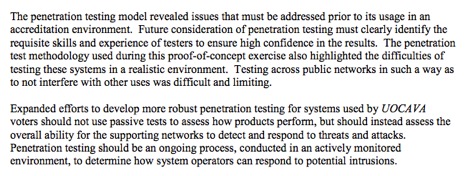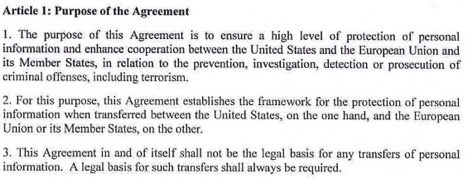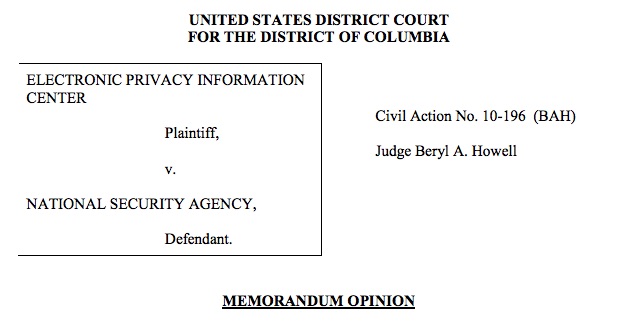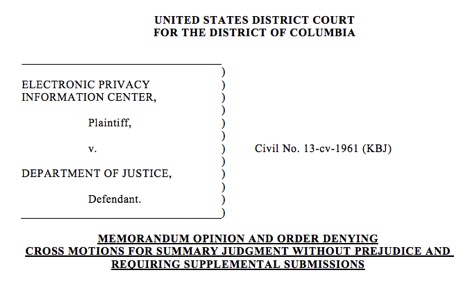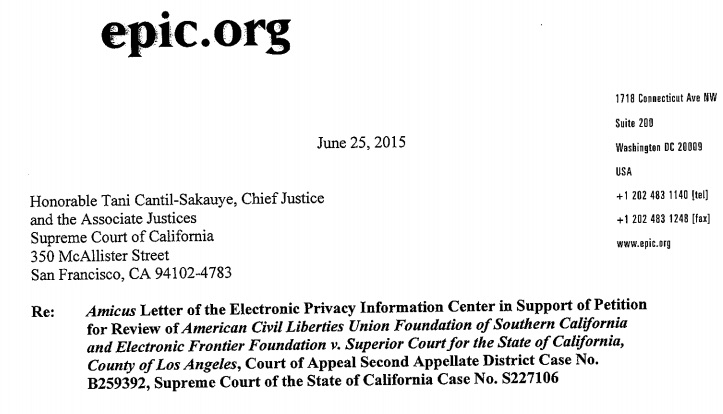FOIA Gallery 2016
The Freedom of Information Act at 50

This year marks the 50th anniversary of the Freedom of Information Act, the landmark open government law that has been the cornerstone of government transparency in the United States. The FOIA has been, and continues to be, critical to the functioning of a democratic government by helping to ensure that citizens are fully informed about matters of public concern. For the past 50 years, countless people have used the FOIA uncover fraud, waste, and abuse in the federal government.
EPIC's work under the FOIA has focused in large part on government surveillance programs. A hallmark of surveillance programs proposed by government agencies is a lack of public accountability. As the government seeks to expand its power to collect information about individuals, it increasingly hides that power behind a wall of secrecy. Congress has long recognized this tendency in the Executive Branch, and sought to limit government secrecy by creating legal obligations of openness under the FOIA and the Privacy Act of 1974. EPIC has used these open government laws aggressively to enable public oversight of potentially invasive surveillance initiatives.
Public awareness of our government's activity through the FOIA not only allows for a more informed public debate over new surveillance proposals, but also ensures accountability for government officials. Public debate fosters the development of more robust security systems and leads to solutions that better respect the nation's democratic values. EPIC's FOIA litigation over the past year has resulted in disclosure of information about several government surveillance programs. Our litigation has also generated case law that benefits the FOIA requesters and the open government community across the country. As EPIC celebrates the 50th anniversary of the FOIA, we also highlight some of our notable successes this past year.
Previous EPIC FOIA Galleries were published in 2001, 2002, 2003, 2004, 2005, 2006, 2010, 2011, 2012, 2013, 2014, and 2015.
For more information about EPIC's FOIA work, see EPIC: Open Government, EPIC: FOIA Cases, EPIC: Open Government Litigation Manual, and FOIA.ROCKS.
EPIC's FOIA Work in 2015
For EPIC's open government project, 2015 was a year filled with great success stories. Through vigorous and effective litigation, EPIC bolstered its record as a champion for a more open and transparent government. It is undeniable that EPIC added to the public debate by uncovering government documents. In 2015, EPIC obtained records from government agencies including the DHS, DOJ, Coast Guard, and the DOD.
EPIC Obtains Defense Department E-Voting Tests
In 2015, EPIC obtained records relating to the Department of Defense's Federal Voting Assistance Program, a program tasked with ensuring that Service members, their eligible family members and overseas citizens can vote from overseas. EPIC sought records describing tests of the agency's e-voting systems. The agency released, agency emails discussing e-voting systems, the "Operation Vote" Report, which "assess[ed] the usability, accessibility, and privacy of electronic voting systems," and unredacted reports describing 1) a test of the agency's e-voting system and 2) a penetration test of a simulated election.
EPIC Forces DOJ to Release EU-US Umbrella Agreement
Through a FOIA lawsuit, EPIC obtained a secret agreement between the United States and the European Union concerning the transfer of personal information. Though US and EU officials finalized the so-called "Umbrella Agreement" in September of 2015, they had kept the final document secret even as the US Congress was voting on provisions to implement the text. The Umbrella Agreement is a framework for transatlantic data transfer between the US and the EU, with a proposed goal of providing data protection safeguards for personal information.
EPIC Shines Light on Massive Boater Tracking Program
EPIC successfully obtained nearly 3,000 pages of mostly unredacted records concerning the Nationwide Automatic Identification System (NAIS). NAIS is a intelligence gathering network that collects and processes information about vessels in coastal and territorial waters. Transceivers located near 58 U.S. ports and 11 U.S. costal areas gather information from vessels equipped with the Automatic Identification System, a ship-to-ship collision avoidance system used worldwide. According to the documents, boaters have “no expectation of privacy with regard to any information transmitted on AIS.” They also reveal that AIS data is “fused” with other intelligence data, and that AIS data has been shared with at least 75 federal, state, local, and private entities.
EPIC Awarded Attorneys' Fees in Case Against NSA
On the litigation front, EPIC was awarded attorneys' fees after securing a decisive victory in a FOIA case against the National Security Agency. EPIC sought to obtain NSPD-54, a Presidential Directive on cyber security that was widely circulated to federal agencies and senior policy advisors. After initially losing in the district court, a court of appeals reversed and ruled in favor of EPIC. In considering EPIC's request for attorneys' fees, a federal court ruled that the NSA's refusal to disclose the document was "incorrect as a matter of law," and that EPIC had "substantially prevailed," in awarding EPIC more than $31,000 in fees.
EPIC Prevails in EPIC v. DOJ Concerning Pen Register Reports
EPIC scored a decisive victory against the Department of Justice. In doing so, EPIC established case law benefitting FOIA plaintiffs across the country. EPIC had sued the Department of Justice to obtain congressional oversight reports detailing the total number of orders for pen registers or trap and trace devices granted or denied, and the total number of pen registers or trap and trace devices installed pursuant to 50 U.S.C. § 1843. In its ruling, the district court concluded that EPIC was “correct to contend that the declarations that DOJ has filed lack the specificity necessary for this Court to evaluate whether DOJ has released all reasonably segregable portions of non-responsive documents and is acting properly to withhold the specific information EPIC now challenges.”
EPIC Urges California Supreme Court to Protect Open Government Law
EPIC has a long tradition as a "friend of the court" in open government lawsuits, and maintained that tradition in 2015. EPIC asked the Supreme Court of California to review a lower court decision that prevented public release of information about "automated license plate readers." The lower court held that information about the system to gather license plate date on all motorists was an "investigative record." In the amicus letter, EPIC stated, "as the government's ability to collect information about individuals has expanded, open record laws have become an important tool for government oversight." Documents obtained by EPIC about the FBI's use of license plate readers showed the agency failed to address the system's privacy implications.
Share this page:
Subscribe to the EPIC Alert
The EPIC Alert is a biweekly newsletter highlighting emerging privacy issues.

